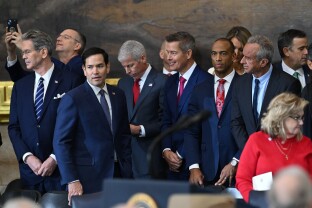President Donald Trump ended his first day back in the White House with one man confirmed to his cabinet: his former rival Marco Rubio.
Rubio will lead the State Department, where he and Trump have promised to advance an “America First” foreign policy.
The Senate confirmed Rubio easily on Monday night, with 99 votes — every senator present — in his favor. Senators often show deference and collegiality to other members of the chamber, especially when they win coveted cabinet nominations. But lawmakers from both parties also said they believe Rubio has the foreign policy chops and temperament to manage the department well.
“It’s in America’s interest not to skip a beat and to fill this role immediately,” Sen. Jeanne Shaheen, the top Democrat on the Foreign Relations Committee, said, noting that his nomination won unanimous support in the committee. “He has the skill, knowledge and qualifications to be secretary of state.”
Rubio pointed to his time in Congress as an explanation for his swift approval.
“Being in the Senate, having had relationships with so many people here for 14 years, it’s a little bit of a different dynamic than some of the other nominees,” Rubio told NOTUS ahead of the vote on Monday. “But we’ve got very good nominees, and I expect them all to be confirmed.”
The show of support for Rubio, even among Democrats, went beyond mere politeness.
“I voted yes,” Sen. Chris Coons of Delaware said after the Foreign Relations panel moved to bring Rubio’s nomination to the Senate floor. “Happy to vote yes for my friend.”
And Democratic senators praised the selection during Rubio’s confirmation hearing.
“The president made a great decision in choosing you,” New Jersey Democratic Sen. Cory Booker told Rubio. “I’m happy to see you there. You’re a thought leader in foreign policy.”
On Monday, Booker told NOTUS he hopes Rubio has “a long and fruitful career serving our country.”
Democrats in the House were also happy with the choice. Rep. Lois Frankel, a Florida Democrat who sits on a committee with oversight of the State Department, said Rubio was one of Trump’s best appointments.
“Rubio will do a great job,” she told NOTUS on Monday. “It does help to have some kind of relationship. And they know when we have to, we’re going to fight back fiercely. But I hope we can find — especially in the foreign affairs issues — I think we can find some common ground.”
Rubio said during his confirmation hearing that the United States must “create a free world out of the chaos” and called for “a strong and confident America that engages in the world, putting our core national interests, once again, above all else.”
He told senators that each action the State Department takes under Trump will hinge on three questions: “Does it make America safer? Does it make America stronger? Does it make America more prosperous?”
During his time in the Senate, Rubio — a Florida Republican — often worked on foreign policy and human rights legislation. He spearheaded bills to support democracy in Hong Kong, crack down on an influx of forced labor products from China and slap sanctions on dictators and war criminals around the world.
“There are many areas that Sen. Rubio and I are in agreement on, including the importance of the United States standing with our allies and remaining a strong voice for democracy and human rights globally,” wrote Oregon Democratic Sen. Jeff Merkley, who has often worked with Rubio on China policy.
“As America’s voice on the global stage, a secretary of state must lead with a steady vision for foreign policy and serve the American people,” Merkley added in his statement. “Sen. Rubio has the expertise to execute that vision, and I look forward to supporting his nomination.”
Now, the real question is how long Rubio and Trump will get along.
“I don’t have a crystal ball,” said Sen. Chris Van Hollen, another Democrat who voted for Rubio. “But we will see. We will leave that to President Trump and Sen. Rubio.”
—
Haley Byrd Wilt is a reporter at NOTUS. Claire Heddles is a NOTUS reporter and an Allbritton Journalism Institute fellow.
Katherine Swartz, a NOTUS reporter and an Allbritton Journalism Institute fellow, contributed to this report.
Sign in
Log into your free account with your email. Don’t have one?
Check your email for a one-time code.
We sent a 4-digit code to . Enter the pin to confirm your account.
New code will be available in 1:00
Let’s try this again.
We encountered an error with the passcode sent to . Please reenter your email.


